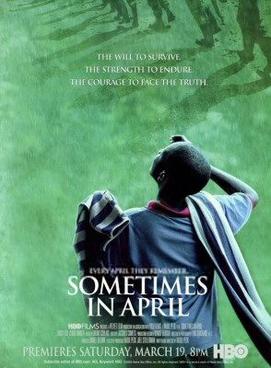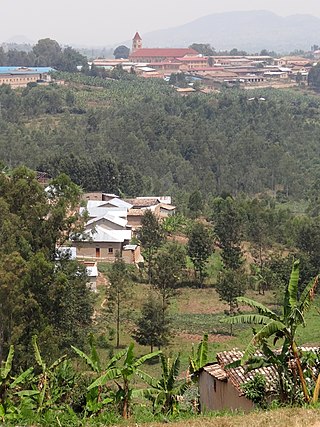Related Research Articles

The International Criminal Tribunal for Rwanda was an international court established in November 1994 by the United Nations Security Council in Resolution 955 in order to judge people responsible for the Rwandan genocide and other serious violations of international law in Rwanda, or by Rwandan citizens in nearby states, between 1 January and 31 December 1994. The court eventually convicted 61 individuals and acquitted 14.

The Rwandan Patriotic Front is the ruling political party in Rwanda. Led by President Paul Kagame, the party has governed the country since its armed wing defeated government forces, winning the Rwandan Civil War in 1994.

The Interahamwe is a Hutu paramilitary organization active in the Democratic Republic of the Congo and Uganda. The Interahamwe was formed around 1990 as the youth wing of the National Republican Movement for Democracy and Development, the then-ruling party of Rwanda, and enjoyed the backing of the Hutu Power government. The Interahamwe, led by Robert Kajuga, were the main perpetrators of the Rwandan genocide, during which an estimated 500,000 to 1,000,000 Tutsi, Twa, and moderate Hutus were killed from April to July 1994, and the term "Interahamwe" was widened to mean any civilian bands killing Tutsi.

The Rwandan genocide occurred between 7 April and 15 July 1994 during the Rwandan Civil War. During this period of around 100 days, members of the Tutsi minority ethnic group, as well as some moderate Hutu and Twa, were killed by armed Hutu militias. The most widely accepted scholarly estimates are around 500,000 to 662,000 Tutsi deaths.
Agathe Uwilingiyimana, sometimes known as Madame Agathe, was a Rwandan political figure. She served as Prime Minister of Rwanda from 18 July 1993 until her assassination on 7 April 1994, during the opening stages of the Rwandan genocide. She was also Rwanda's acting head of state in the hours leading up to her death.

Butare was a province (prefecture) of Rwanda prior to its dissolution in January 2006. Butare city was the second largest city in Rwanda and one of the nation's former twelve provinces. It is located in south-central region of the country and borders Burundi to the south. It had a population of 77.449 as of January 2006.

The assassination of presidents Juvénal Habyarimana and Cyprien Ntaryamira in the evening of April 6, 1994 was the proximate trigger for the Rwandan genocide, which resulted in the murder of approximately 800,000 Tutsi and a smaller number of moderate Hutu. The first few days following the assassinations included a number of key events that shaped the subsequent course of the genocide. These included: the seizing of power by an interim government directed by the hard-line Akazu clique; the liquidation of opposition Hutu politicians; the implementation of plans to carry out a genocide throughout the country; and the murder of United Nations peacekeepers, contributing to the impulse of the international community to refrain from intervention.

Pauline Nyiramasuhuko is a Rwandan politician who was the Minister for Family Welfare and the Advancement of Women. She was convicted of having incited troops and militia to carry out rape during the Rwandan genocide of 1994. She was tried for genocide and incitement to rape as part of the "Butare Group" at the International Criminal Tribunal for Rwanda (ICTR) in Arusha, Tanzania. In June 2011, she was convicted of seven charges and sentenced to life imprisonment. Nyiramasuhuko is the first woman to be convicted of genocide by the ICTR, and the first woman to be convicted of genocidal rape.

Sometimes in April is a 2005 American made-for-television historical drama film about the 1994 Rwandan Genocide, written and directed by the Haitian filmmaker Raoul Peck. The ensemble cast includes Idris Elba, Oris Erhuero, Carole Karemera, and Debra Winger.

The Akazu was an informal organization of Hutu extremists whose members contributed strongly to the 1994 Rwandan genocide. A circle of relatives and close friends of Rwanda's then-president Juvénal Habyarimana and his influential wife Agathe Habyarimana, they were also called the Zero Network, for their goal of a Rwanda with zero Tutsi.
The Anglican Church of Rwanda is a province of the Anglican Communion, covering 13 dioceses in Rwanda. The primate of the province is Laurent Mbanda, consecrated on 10 June 2018.
Callixte Kalimanzira was the interior minister of the interim government of Rwanda during the 1994 genocide.

The following is a partial chronology of significant events surrounding the 1994 Rwandan genocide.

Charles Ayodeji Adeogun-Phillips is a former United Nations genocide and war crimes prosecutor, international lawyer and founder of Charles Anthony (Lawyers) LLP.
Jerry Robert Kajuga was national president of the Interahamwe, the group largely responsible for perpetrating the Rwandan genocide against the Tutsi people in 1994. Born to a Tutsi father and a Hutu mother, Kajuga concealed his background and presented himself as being of pure Hutu descent. It was said that being Tutsi, he nearly collaborated with Paul Kagame by helping the RPF Inkotanyi soldiers to infiltrate his Interahamwe for exterminating many Tutsis. This is notable as Hutu Power extremist groups considered Hutus who married Tutsis to be race traitors, and Kajuga went to great lengths to conceal his identity.
Rwandan genocide denial is the assertion that the Rwandan genocide did not occur, specifically rejection of the scholarly consensus that Rwandan Tutsis were the victims of a genocide between 7 April and 15 July 1994. The perpetrators, a small minority of other Hutu, and a fringe of Western writers dispute that reality.
Augustin Nshamihigo was the first Primate of the Episcopal Church of Rwanda, now called Anglican Church of Rwanda.

Kantano Habimana, commonly referred to as Kantano, was a presenter (animateur) on the Rwandan radio station RTLM, which played a significant role in promoting the genocide against the Tutsi. Like the station's other broadcasters, Habimana incited violence against Tutsi and moderate Hutu on the air.

Kabgayi is just south of Gitarama in Muhanga District, Southern Province, Rwanda, 25 miles (40 km) southwest of Kigali. It was established as a Catholic Church mission in 1905. It became the center for the Roman Catholic Church in Rwanda and is the site of the oldest cathedral in the country and of Catholic seminaries, schools and a hospital. The church at first supported the Tutsi ruling elite, but later backed the Hutu majority. During the 1994 Rwandan genocide thousands of Tutsis who had taken refuge here were killed. Some survivors admire the courage of many priests who helped them during those difficult days, like Father Evergiste RUKEBESHA and many others. Later, some Hutus including three bishops and many priests were killed by the rebels RPF soldiers. A mass grave beside the hospital is marked by a memorial. Inside the Basilica are kept the bodies of the three bishops killed by FPR rebels. Two of them were refused by the Rwandan government to be transferred in their own cathedrals.
Jean-Baptiste Habyalimana was a Rwandan academic and politician who served as the Prefect of Butare and was killed during the Rwandan genocide in 1994. He was the only Tutsi prefect at the time of the genocide, and also the only prefect belonging to the Liberal Party. He had resisted the genocide.
References
- 1 2 3 "Jonathan Ruhumuliza" . Crockford's Clerical Directory (online ed.). Church House Publishing . Retrieved 18 June 2016.
- 1 2 3 4 5 6 7 "How 'accomplice' to Rwanda genocide turned up in a rural English pulpit". the Guardian. February 15, 2014.
- ↑ "ICTR-97-23 | United Nations International Criminal Tribunal for Rwanda". unictr.irmct.org.
- ↑ "Rwanda: Leave None To Tell The Story". www.hrw.org.
- ↑ "Church of England faces fresh claims over Midlands vicar's role in Rwanda genocide". the Guardian. April 5, 2014.
- ↑ "Bishop Samuel Musabyimana dies | United Nations International Criminal Tribunal for Rwanda". unictr.irmct.org.
- ↑ BBC Hereford & Worcester — A former Bishop of Kigali moves to Droitwich (Accessed 7 November 2016)
- ↑ "Appointments". www.churchtimes.co.uk.
- ↑ http://www.cofe-worcester.org.uk/news/2014/02/16/statement-response-allegations-about-bishop-jonathan-ruhumuliza/ Archived 2018-09-13 at the Wayback Machine Diocese of Worcester — Statement in response to allegations about Jonathan Ruhumuliza